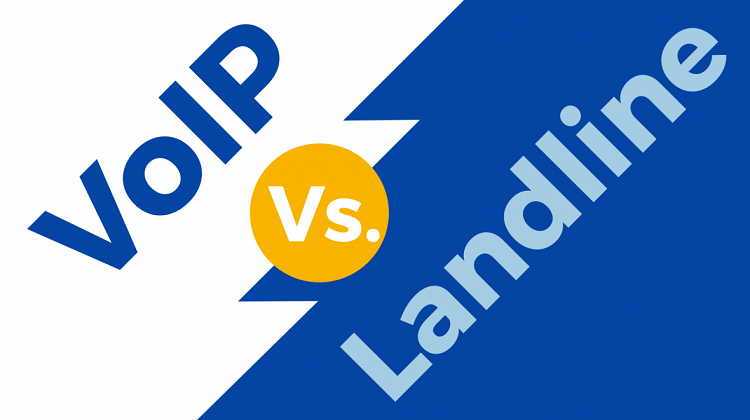
Despite the evolution of telecoms technologies, phone calls still have their unique importance for customers. Nonetheless, email, chatbots, live chat, and social media platforms are becoming increasingly popular as customer interaction channels. But still, there’s plenty of people who want to talk to a real person.
VoIP vs Landline
An efficient phone system for business ensures a good communication flow with customers, partners, suppliers, and employees. Landlines have remained the most common tool for telecommunications for a long time.
Nowadays businesses are trending towards internet-based phone systems, called VoIP phones. VoIP offers several benefits over the traditional landlines: its cost-efficient, escalable, allows you to work from anywhere, it offers flexibility in features, it’s reliable and it has a good sound quality.
If you own a small business and are considering switching to VoIP due to its benefits, you must research what systems are a better match for your needs. It’s not always about following the trend, it’s about what adequates best to your unique business needs. Let’s take a look at VoIP and landlines, how they work, and which one might suit you better as a small business.
What is VoIP?
The term VoIP stands for Voice Over Internet Protocol which means that it’s an internet-enabled phone service. The alternative terms used for this technology are IP telephony, broadband phone service, or internet telephony and it refers to using your computer or other internet-based devices for making calls.
The numerous benefits of VoIP have also supported stats. Corporate VoIP subscribers worldwide in 2020 nearly reached around 204.8 billion. The best part is that subscribers are not only the big business giants but small businesses are also opting for this technology. This is because there could be a reduction of up to 90% on overhead spendings for small businesses that use VoIP.
VoIP can also improve your small business’ productivity by helping you generate more leads, close more sales, work from anywhere, have conference calls, etc.
How Does It Work?
A VoIP technology enables phone calls to run over a broadband connection by using a packet-switched protocol. The analogue voice signals are converted into digital signals and come back into their original form when they reach the recipient.
When using VoIP, all data is automatically saved in a detailed manner, unlike traditional landlines. You can manage your VoIP by using the online dashboard and adjust your contacts, phone number, and other features.
To make a call through VoIP, you can use the following strategies:
- You have a regular landline phone and an adapter and you can make calls through the internet.
- You can use some applications to make calls such as Skype through your computer or your mobile phone.
- You can use a VoIP software interface.
What is Landline?
Invented in 1876, the landline phone system remained one of the few communication methods for both personal and professional interaction. It refers to both the phone number and the physical devices that businesses still use in their offices.
How Does It Work?
Landline telephones send signals using physical switch boxes through copper wire. These signals are sent from one phone to another and there is no risk of packet loss and other instances affecting speed.
It is considered a highly reliable and fast way of communication, though nowadays we have the option to avoid all that wiring, maintenance and infrastructure of traditional landlines.
VOIP vs Landline: Which One Should Your Small Business Use?
Several factors need to be considered when switching to VoIP. One of the major concerns of small businesses is actually saving money and not spending on unnecessary software.
However, VoIP actually helps your business reduce costs, by getting rid of phone bills and charges, allowing you to handle multiple lines in a single device, allowing you to hire remote workforce, integrate with emerging software, eliminating maintenance costs, etc.
Here are some scenarios in which switching to VoIP can benefit you:
- You want to replace old equipment
- you have too many different telephone lines
- You have too many international clients
- You have a highly reliable internet connection
- Your business is growing rapidly
- Most of your employees are remote workers
- You want to make yourself available for customers without sitting at the office all-day
Now, you may be wondering how exactly is VoIP going to help my finances and my business? Let’s take a look at some interesting stats to find out:
- Small Businesses can save around 40% of local call rates when switching to VoIP
- VoIP can take these savings as high as 90% when we talk about international calling costs
- The VoIP services market is expected to reach $194.5 billion by 2024
- VoIP may accommodate calls anywhere, allowing companies to increase productivity by up to 20%
- Last but not least, businesses can save up to 75% on communication in case they go for VoIP
- 82% of businesses report cost savings when they moved to the cloud
Summary | VoIP vs Landline
The trend of landlines is diminishing despite their reliability. With time, the quality and reliability of broadband connections will be much superior.
Landlines are difficult to manage when you are running most of your official work online or if you have many employees working remotely. In case you or your staff members are mostly on-site, they also benefit from VoIP numbers by being able to handle multiple phone calls and registering every interaction.
As you can see VoIP offers great advantages compared to traditional landlines. Your Small Business may take great benefits by switching to this technology. However, it’s your job to analyze your options, to budget your expenses and make the best decision based on your business goals and needs.

